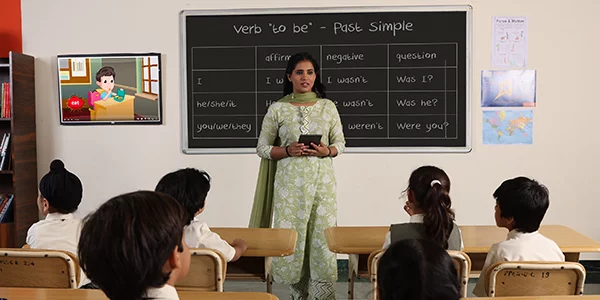Primary Science Tuition Singapore for Building Confidence in Science
Wiki Article
Exploring the Different Training Strategies in Main Scientific Research Education And Learning Today
Inquiry-based discovering, hands-on experiments, and the integration of technology are redefining just how teachers engage young minds. In addition, collective approaches and distinguished instruction are being utilized to provide to the diverse requirements of students, improving both engagement and understanding.Inquiry-Based Discovering
Inquiry-Based Understanding (IBL) is an instructional method that urges students to check out scientific concepts via questioning, investigation, and hands-on testing. This method highlights the role of students as active individuals in their knowing, promoting essential reasoning and analytical skills. By involving with real-world questions, students become curious and motivated, which enhances their understanding of scientific principles.In IBL, educators act as facilitators, guiding students as they browse their inquiries instead of supplying info straight. This student-centered technique permits for distinction, accommodating numerous discovering styles and paces. Students develop abilities in formulating theories, designing experiments, and evaluating data, which are vital for scientific proficiency.
Additionally, IBL cultivates partnership amongst trainees, encouraging them to share searchings for and concepts. This collective inquiry promotes social abilities and a sense of area within the class. The procedure of inquiry encourages strength, as students discover to accept failing as a stepping stone towards understanding.
Hands-On Experiments
Hands-on experiments are a vital part of efficient scientific research education and learning, matching the concepts of inquiry-based discovering. These experiments permit trainees to engage directly with scientific ideas, fostering a much deeper understanding via experiential learning. By adjusting materials and observing outcomes, young learners can realize abstract concepts in substantial means.Such tasks promote critical reasoning and problem-solving abilities, as trainees hypothesize results, conduct experiments, and analyze outcomes. This procedure encourages them to ask inquiries, improve their understanding, and develop a clinical frame of mind. Hands-on experiments can be tailored to diverse discovering styles, making sure that all students have the possibility to involve meaningfully with the web content.
In addition, hands-on experiments often encourage cooperation among peers, advertising synergy and interaction skills. Operating in groups makes it possible for trainees to share concepts, talk about findings, and pick up from one an additional, which enhances their total educational experience.
Incorporating hands-on experiments right into the main science curriculum not only enriches the finding out environment however also cultivates a lifelong rate of interest in scientific research. By proactively taking part in their education, trainees are more likely to establish an interest for clinical query that extends past the classroom.

Modern Technology Assimilation
Integrating innovation right into main science education and learning has become significantly vital in promoting student engagement and enhancing learning end results. Making use of electronic devices, such as interactive simulations, digital laboratories, and educational software application, gives students with opportunities to discover clinical concepts in innovative ways. These sources help with a deeper understanding of complex topics by permitting students to visualize and manipulate variables that would certainly be not practical in a conventional class setting.In addition, innovation integration motivates individualized finding out experiences. Read Full Report Students can progress at their own speed, revisiting difficult concepts through multimedia sources, which accommodate various learning styles. This flexibility not just sustains private development however additionally grows a feeling of autonomy in students.
Additionally, technology functions as a bridge to real-world scientific research, linking students with current research and professional contributions. Accessibility to clinical journals and on the internet data sources broadens pupils' point of views on scientific inquiry and cultivates critical thinking skills.
Collaborative Learning
Collaborative knowing plays a vital role in primary science education and learning by promoting synergy and communication abilities among pupils. This technique encourages learners to function together, share expertise, and participate in problem-solving, which boosts their understanding of scientific ideas. By taking part in group tasks, students learn to express their ideas, listen to varied point of views, and discuss remedies, all of which are essential skills in both academic and real-world contexts.
Study indicates that collaborative knowing can lead to boosted motivation and interaction in science topics, as trainees find enjoyment in common experiences (primary science tuition Singapore). Additionally, this approach prepares pupils for future collective undertakings, equipping them with the skills needed for efficient team effort in college and expert atmospheres. Ultimately, embracing collective understanding in key scientific research education and learning can dramatically improve the understanding experience and advertise a deeper understanding of scientific inquiry
Distinguished Direction

Separated direction can manifest in different methods, such as differing the material, processes, or products of discovering. Instructors might use tiered projects that supply differing levels of complexity, enabling trainees to work at their corresponding readiness levels. Additionally, flexible grouping techniques can assist in partnership among pupils with different capacities, cultivating peer understanding.
Evaluation plays an important role in this approach, as it informs direction and helps teachers recognize each student's unique needs. Developmental analyses, such as observations and tests, can guide teachers in readjusting their approaches to enhance finding out end results. primary science tuition Singapore. Eventually, by executing separated guideline in main scientific research education and learning, instructors can grow an extra efficient and equitable knowing atmosphere, equipping all pupils to reach their full capacity in understanding scientific sensations
Conclusion
In summary, the varied teaching strategies in key science education, consisting of inquiry-based knowing, hands-on experiments, modern technology combination, joint learning, and set apart instruction, jointly add to an extra reliable understanding atmosphere. These methods advertise important thinking, analytic skills, and a deeper comprehension of clinical concepts. By carrying out these strategies, teachers can develop supportive and interesting classrooms that attend to the different demands of students, eventually fostering a long-lasting interest in science and improving scholastic success.Inquiry-Based Learning (IBL) is a pedagogical strategy that encourages trainees to check out scientific principles with wondering about, investigation, and hands-on experimentation.Collective learning plays a vital role in primary scientific research education and learning by fostering teamwork and communication skills amongst trainees.Research suggests that collective discovering can lead to boosted inspiration and engagement in scientific research topics, as pupils find pleasure in shared experiences.In fostering a comprehensive discovering setting, separated guideline emerges as a key method to suit the diverse requirements and abilities of pupils in primary science education. Inevitably, by applying distinguished instruction in key science education and learning, Visit Your URL teachers can cultivate a much more efficient and equitable understanding atmosphere, empowering all pupils to reach their complete potential in understanding clinical phenomena.
Report this wiki page